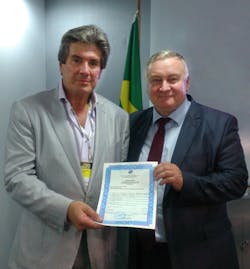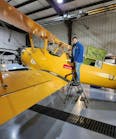Russian Helicopters Gives Green Light to Brazilian Service Centre
Russian Helicopters, a subsidiary of Oboronprom, part of State Corporation Rostec, has granted certification to a service centre in Brazil run by Helipark Taxi Aéreo e Manutenção Aeronáutica. Sergei Ostapenko, the company’s sales director for commercial helicopters, awarded the Certificate of Authorisation for the centre to Helipark’s President João Velloso at a ceremony on August 12 in São Paulo, where Russian Helicopters is exhibiting at the Latin American Business Aviation Conference and Exhibition (LABACE 2014).
Certification of the Brazilian service centre will help to further expand the geography of successful operations of Ka-32 type helicopters in South America.
“We are very happy and proud on becoming Russian Helicopters service centre and we hope to give support not only to our helicopter but to others in the near future. Our Kamov Ka-32 is a great tool for several uses and unrivalled on its performance”, said João Velloso, Helipark’s President.
“Certification of the service centre is a natural continuation of our successful partnership with Helipark, and we believe it will have a positive effect on the promotion of Russian-built Kamov-brand commercial helicopters in South America,” said Sergei Ostapenko, Russian Helicopters sales director for commercial helicopters. “This is a key region for Russian Helicopters, and we are keen to offer high-quality service to helicopter operators throughout the whole product life-cycle.”
Helipark’s authorised service centre will be able to offer a full range of repair and maintenance services for components and fuselages of coaxial helicopters under operational and technical documentation for the Ka-32A11BC, which the company has successfully operated since 2012. The Ka-32A11BC is used to carry industrial cargos on an external sling, as well as to support infrastructure construction works in remote regions of the Amazon basin.
Under agreements between Russian Helicopters and Helipark, the service centre will have access to technical materials, updated on an ongoing basis, for the Ka-32A11BC and its components. Russian Helicopters will provide technical support for maintenance work carried out by the Brazilian company on Russian-built helicopters and any structural changes needed to the helicopters, and also stands ready to organise professional training courses for Helipark staff.
The Ka-32A11BC currently operates in more than 30 countries around the world, including EU states, South Korea, China, Japan, Kazakhstan, Canada and Russia. It can fly missions ranging from search-and-rescue to supporting high-rise construction work, fire-fighting, cargo transportation inside the cabin or on an external sling, support for logging operations, evacuation of sick and wounded personnel, and routine patrolling and monitoring.
A key priority for Russian Helicopters is providing high-quality service and post-sales maintenance of helicopters. Today the company has service centres in South Korea, Canada and Spain, and is working with Rosoboronexport and Oboronprom on a number of further projects. Next year it is planned to open a service centre for Mi-8 and Mi-17-1V helicopters in Egypt, to be followed in 2016 by an Mi-35M service centre in Brazil and one for Mi-171Sh helicopters in Peru. Also in 2016 fitting work is expected to complete at a repair plant in India to service Mi-17V-5 helicopters. Russian Helicopters intends to continue the global roll-out of its network to bring it into line with global leading standards.
Helipark is a specialized service centre for helicopters that operates in Brazil since 2002. The company is certified to offer maintenance of up to 35 aircraft models, including Agusta Westland, Airbus Helicopters, Bell Helicopters and Robinson. With three hangars measuring 90.000 ft sq, Helipark also offers all necessary infrastructure for carrying out runway attendance, fueling, hangar service, helicopter paint, interior and upholstery, bird-proof windshield, armoring and air load transportation (Helicargo).
Russian Helicopters, JSC is a subsidiary of UIC Oboronprom, which in turn is a part of State Corporation Rostec. It is one of the global leaders in helicopter production and the only helicopter design and production powerhouse in Russia. Russian Helicopters is headquartered in Moscow. The company comprises five helicopter production facilities, two design bureaus, a spare parts production and repair facility, as well as an aftersale service branch responsible for maintenance and repair in Russia and all over the world. Its helicopters are popular among Russian ministries and state authorities (Ministry of Defence, Ministry of Internal Affairs, Emergency Control Ministry), operators (Gazpromavia, UTair), major Russian corporations. Over 8000 helicopters of Soviet/Russian make are operated in 110 countries worldwide. Traditionally the demand is highest in the Middle East, Africa, Asia-Pacific, Latin America, Russia, and CIS countries. Russian Helicopters was established in 2007. In 2013 its IFRS revenues increased 10% to RUB 138.3 billion. Deliveries reached 275 helicopters.
UIC Oboronprom, JSC is a multi-profile industrial and investment group established in 2002. It is a part of Russian Technologies State Corporation. Its main tasks include: helicopter engineering (Russian Helicopters, JSC) and engine-building (United Engine Industry Corporation managing company).
State Corporation Rostec is a Russian corporation founded in 2007 for the purpose of promoting the development, production and export of hi-tech civilian and military industry products. It comprises 663 organizations, nine of which have now been formed as holding companies of the military-industrial complex and five of them are involved in civil industries. Rostec’s organizations are located in 60 constituent entities of the Russian Federation and supply their products to the markets of more than 70 countries. The revenue of Rostec in 2013 amounted to RUB 1, 04 trillion, with net profit of RUB 40 billion. The tax deductions into the treasuries at all levels exceeded RUB 138 billion.

